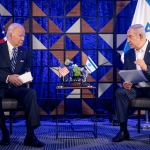The past decade could have, and perhaps should have been a time for Christians to begin learning about Islam. But that didn’t happen very much. Instead we learned about the terror tactics of ‘racial Islam’, and some of us even made the grave error of generalizing radical Islam, imputing those values to all Muslims. This is very kind of objectification that Jesus warned against when he spoke of people who ‘have eyes but don’t see’, ‘ears but don’t hear.’ It’s time to step away from our stereotypes and get educated.
One of the better tools that might help you towards that end is Mark Siljander’s book, “A Deadly Misunderstanding”. Mark shares the evolution of his own thinking on the Christian/Muslim divide with us, going all the way back to his being offended by a Muslim speaking at the National Prayer Breakfast in DC, to how his senate, and later ambassador responsibilities intersected with his Christian faith to create a crisis of questions: “How can I learn to show love to Muslims?” This first question led Mark to approach heads of state from the middle-east and North Africa as one eager to learn about the values and beliefs of Islam. He began studying languages, including Aramaic (the language Jesus spoke), bought a copy of the Koran and began reading and studying it.
The book is a blend of narrative (Mark’s own expanding web of relationships with Islamic leaders, teachers, and scholars), and theology (Mark’s ever expanding discoveries of common beliefs between Christians and Muslims). I won’t reveal those points of common interest because I think you should take the time to read the book. After all, nearly every nation in which our military is involved in conflict has a sizable Muslim presence. Conventional wisdom, even, would tell us that we should know our enemy. Jesus would tell us that we should love our enemy. Mark will tell us that when we begin to study our enemy, we realize that he might not even BE our enemy, that we perhaps share more in common, than we differ.
I was skeptical as I read the book because I found myself thinking, at each point, “Yes, we might share that in common, but what about…?” as I raised the flag of a great divide between Islam and Christianity. Then Mark would address my concern. I’d be satisfied for a few pages, and then ask again, and then again. Each time, Mark has an answer.
Mark isn’t saying there are no differences between our respective faiths. He is saying that we can find fellowship and even friendship by focusing on the ethics and teachings of Jesus and discussing them with Muslims, that this is a common ground. This work will challenge your notions of evangelism, and even the use of the word Christian, as Mark hints that Jesus didn’t come to establish a new religion at all, but rather to draw people into relationship with Himself. I disagree on this last point (Jesus is the head of a body called ‘the church’, and though the church has mucked things up over the centuries countless times, the truth is that when we’re called to Christ, we’re called into a community of faith, because Christ’s life is displayed through community). In spite of my disagreement on this point, I think Mark has made some remarkable discoveries.
He’s shared his research about common points between the two faiths with scholars of both Christianity and Islam, along with Evangelical leaders, and found an overwhelmingly positive response. I’m so intrigued with what he’s done that I’m hoping to find a way to have him visit us here in Seattle for a weekend. We’ll see what happens.
I enjoyed the book for personal reasons as well. I did a wedding in DC this past summer for some Bethany missionaries, and as Mark began sharing his story, several names of people I’d met at the wedding popped up, including the father of the bride! This makes me all the more intent on finding a way to further the discussion.
Buy the book, because you’ll want to mark it up. Don’t swallow everything without thinking, praying, and searching the Bible. But don’t reject anything simply because it doesn’t fit what you’ve heard before. The points of common ground with Muslims just might be one of the most important discoveries of the past ten years, and getting the word out, an central mission for next ten.
Cheers…















